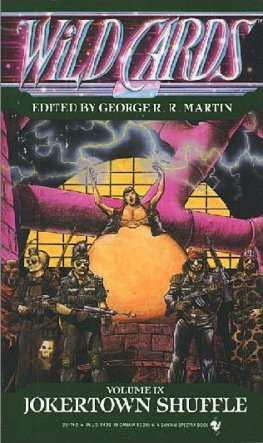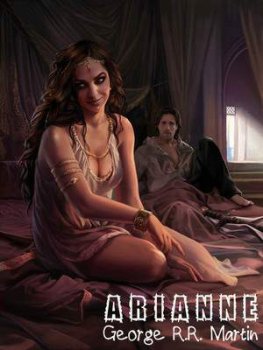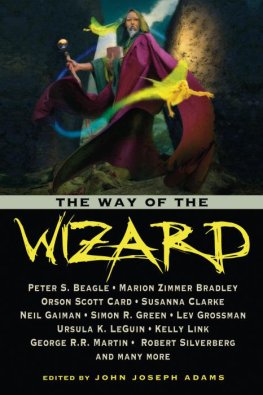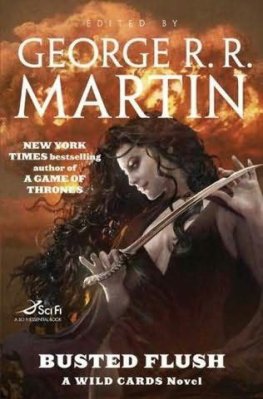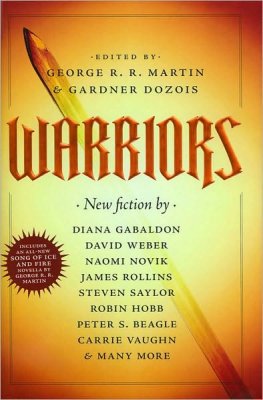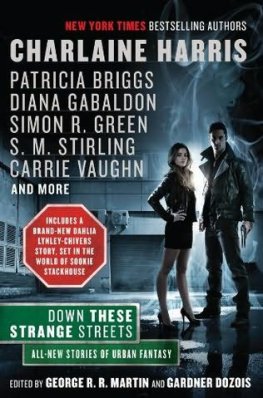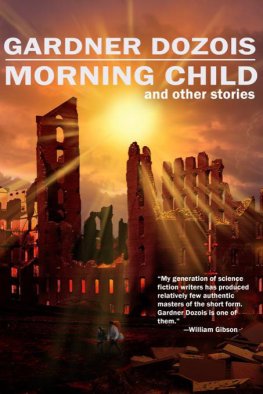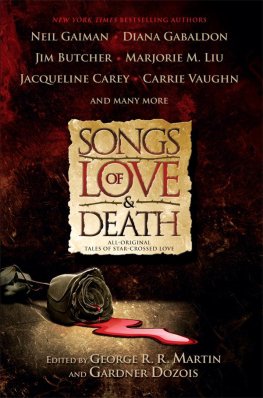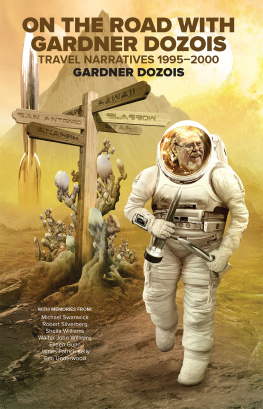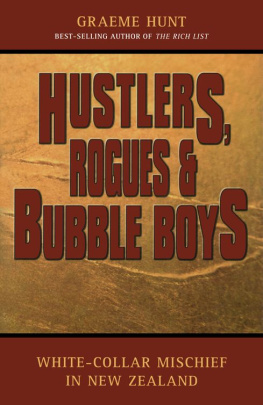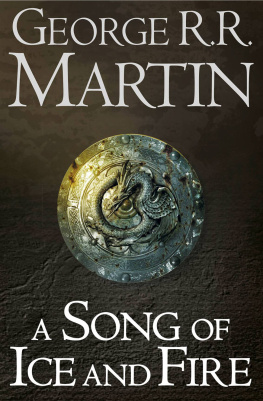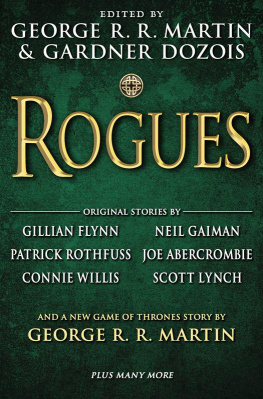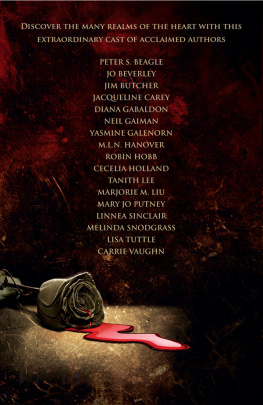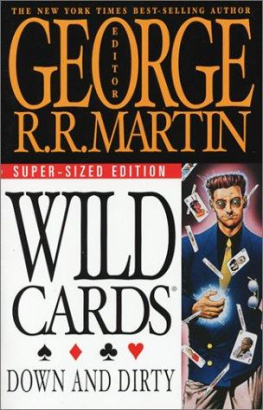


Introduction
EVERYBODY LOVES A ROGUE
by
George R. R. Martin
though sometime we live to regret it.
Scoundrels, con men, and scalawags. Neer-do-wells, thieves, cheats, and rascals. Bad boys and bad girls. Swindlers, seducers, deceivers, flimflam men, imposters, frauds, fakes, liars, cads, tricksters they go many names, and they turn up in stories of all sorts, in every genre under the sun, in myth and legend and, oh, everywhere in history as well. They are the children of Loki, the brothers of Coyote. Sometimes they are heroes. Sometimes they are villains. More often they are something in between, grey characters and grey has long been my favorite color. It is so much more interesting than black or white.
I guess I have always been partial to rogues. When I was boy in the fifties, it sometimes seemed that half of prime-time television was sitcoms, and the other half was Westerns. My father loved Westerns, so growing up, I saw them all, an unending parade of strong-jawed sheriffs and frontier marshals, each more heroic than the last. Marshal Dillon was a rock, Wyatt Earp was brave, courageous, and bold (it said so right in the theme song), and the Lone Ranger, Hopalong Cassidy, Gene Autry, and Roy Rogers were heroic, noble, upstanding, the most perfect role models any lad could want but none of them ever seemed quite real to me. My favorite Western heroes were the two who broke the mold: Paladin, who dressed in black (like a villain) when on the trail and like some sissified dandy when in San Francisco, kept company (ahem) with a different pretty woman every week, and hired out his services for money (heroes did not care about money); and the Maverick brothers (especially Bret), charming scoundrels who preferred the gamblers attire of black suit, string tie, and fancy waistcoat) to the traditional marshals garb of vest and badge and white hat, and were more likely to be found at a poker table than in a gunfight.
And, you know, when viewed today, Maverick and Have Gun, Will Travel hold up much better than the more traditional Westerns of their time. You can argue that they had better writing, better acting, and better directors than most of the other horse operas in the stable, and you would not be wrong but I think the rogue factor has something to do with it as well.
But its not just fans of old television Westerns who appreciate a good rogue. Truth is, this is a character archetype that cuts across all mediums and genres.
Clint Eastwood became a star by playing characters like Rowdy Yates, Dirty Harry, and the Man With No Name, rogues all. If instead he had been cast as Goody Yates, By-the-Book Billy, and the Man with Two Forms of Identification, no one would ever have heard of him. Now, its true, when I was in college I knew a girl who preferred Ashley Wilkes, so noble and self-sacrificing, to that cad Rhett Butler, gambler, blockade-runner but I think shes the only one. Every other woman Ive ever met would take Rhett over Ashley in a hot minute, and lets not even talk about Frank Kennedy and Charles Wilkes. Harrison Ford comes across rather roguishly in every part he plays, but of course it all started with Han Solo and Indiana Jones. Is there anyone who truly prefers Luke Skywalker to Han Solo? Sure, Han is only in it for the money, he makes that plain right from the start which makes it all the thrilling when he returns at the end of Star Wars to put that rocket up Darth Vaders butt. (Oh, and he DOES shoot first, no matter how George Lucas retcons that first movie.) And Indy Indy is the very definition of rogue. Pulling out his gun to shoot that swordsman wasnt fair at all but my, didnt we love him for it?
But its not just television and film where rogues rule. Look at the books.
Consider epic fantasy.
Now, fantasy often gets characterized as a genre in which absolute good battles absolute evil, and certainly that sort of thing is plentiful, especially in the hands of the legions of Tolkien imitators with their endless dark lords, evil minions, and square-jawed heroes. But there is an older subgenre of fantasy that absolutely teems with rogues, called sword & sorcery. Conan of Cimmeria is sometimes characterized as a hero, but let us not forget, he was also a thief, a reaver, a pirate, a mercenary, and ultimately a usurper who installed himself on a stolen throne and slept with every attractive woman he met along the way. Fafhrd and the Grey Mouser are even more roguish, albeit somewhat less successful. It is unlikely either one will end up a king. And then we have Jack Vances thoroughly amoral (and thoroughly delightful) Cugel the Clever, whose scheming never quite seems to produce the desired results, but still
Historical fiction has its share of dashing, devious, untrustworthy scalawags as well. The Three Musketeers certainly had their roguish qualities. (You cannot really buckle a swash without some). Rhett Butler was as big a rogue in the novel as he was in the film. Michael Chabon gave us two splendid new rogues in Amram and Zelikman, the stars of his historical novella Gentleman of the Road, and I for one hope we see a lot more of that pair. And of course there is George MacDonald Frasers immortal Harry Flashman (thats Sir Harry Paget Flashman VC KCB KCIE to you, please), a character kinda sorta borrowed from Toms Brown Schooldays, Thomas Hughess classic British-boarding-school novel (sort of like Harry Potter without quidditch, magic, or girls). If you havent read MacDonalds Flashman books (you can skip the Hughes, unless youre into Victorian moralizing), you have yet to meet one of literatures great rogues. I envy you the experience.
Western? Hell, the whole Wild West teemed with rogues. The outlaw hero is just as common as the outlaw villain, if not more so. Billy the Kid? Jesse James and his gang? Doc Holliday, rogue dentist extraordinaire? And if we may glance back at television once againpay cable this time, thoughwe also have HBOs fabulous and much-lamented Deadwood, and the dastard at the center of it, Al Swearengen. As played by Ian MacShane, Swearengen completely stole that show from its putative hero, the sheriff. But then, rogues are good at stealing. Its one of the things that they do best.
What about the romance genre? Hoo. The rogue almost always gets the girl in a romance. These days the rogue IS the girl, oft as not, which can be even cooler. It is always nice to see conventions standing on their head.
Mystery fiction has entire subgenres about rogues. Private eyes have always had that aspect to them; if they were straight-up, by-the-book, just-the-facts-mam sort of guys, they would be cops. Theyre not.
I could go on. Literary fiction, gothics, paranormal romance, chick lit, horror, cyberpunk, steampunk, urban fantasy, nurse novels, tragedy, comedy, erotica, thrillers, space opera, horse opera, sports stories, military fiction, ranch romances every genre and subgenre had its rogues, as often as not theyre the characters most cherished and best remembered.
All those genres are not represented in this anthology, alas but there is part of me that wishes that they were. Maybe its the rogue in me, the part of me that loves to color outside the line, but the truth is, I dont have much respect for genre barriers. These days I am best known as a fantasy writer, but
Next page

